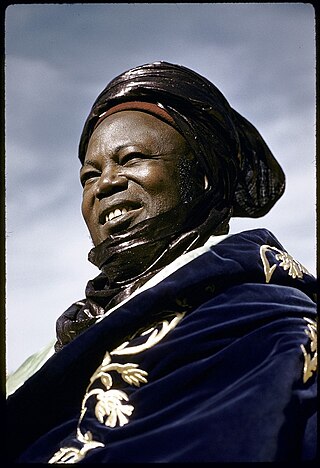Related Research Articles

Sokoto is a major city located in extreme north-western Nigeria, near the confluence of the Sokoto River and the Rima River. As of 2006, it has a population of over 427,760. Sokoto is the modern-day capital of Sokoto State and was previously the capital of the north-western states. Modern Sokoto is known for trading sheepskins, cattle hides, leather crafts, kola nuts and goatskins.

The Sokoto Caliphate, also known as the Sultanate of Sokoto, was a Sunni Muslim caliphate in West Africa. It was founded by Usman dan Fodio in 1804 during the Fulani jihads after defeating the Hausa Kingdoms in the Fulani War. The boundaries of the caliphate are part of present-day Cameroon, Burkina Faso, Niger, and Nigeria. By 1837, the Sokoto state had a population of around 10-20 plus million people, becoming the most populous empire in West Africa. It was dissolved when the British, French and Germans conquered the area in 1903 and annexed it into the newly established Northern Nigeria Protectorate, Senegambia and Niger and Kamerun respectively.

Muhammadu Bello was the first Caliph of Sokoto and reigned from 1817 until 1837. He was also an active writer of history, poetry, and Islamic studies. He was the son and primary aide to Usman dan Fodio, the founder of the Sokoto Caliphate and the first caliph. During his reign, he encouraged the spread of Islam throughout the region, increasing education for both men and women, and the establishment of Islamic courts. He died on October 25, 1837, and was succeeded by his brother Abu Bakr Atiku and then his son, Aliyu Babba.

Sir Siddiq Abubakar III, GCON, KBE was a Nigerian Muslim leader. He was the 17th Sultan of Sokoto between 17 June 1938 and 1 November 1988, making him the longest-reigning Sultan.

Gobir was a city-state in what is now Nigeria. Founded by the Hausa in the 11th century, Gobir was one of the seven original kingdoms of Hausaland, and continued under Hausa rule for nearly 700 years. Its capital was the city of Alkalawa. In the early 19th century elements of the ruling dynasty fled north to what is today Niger from which a rival dynasty developed ruling as Sarkin Gobir at Tibiri. In 1975 a reunited traditional sultanate took up residence in Sabon Birni, Nigeria.

Sir Ahmadu Bello, famously known as Sardauna of Sokoto, was a conservative Nigerian statesman who was one of the leading northern politicians in 1960 and served as its first and only premier from 1954 until his assassination in 1966, in which capacity he dominated national affairs for over a decade.
Muhammadu Maccido Abubakar III, often shortened to Muhammadu Maccido, was the 19th Sultan of Sokoto in Nigeria. He was the son and primary aide to Siddiq Abubakar III (1903–1988) who had been the Sultan of Sokoto for 50 years.

Muhammadu Sa'ad AbubakarCFR is the 20th Sultan of Sokoto. As Sultan of Sokoto, he is considered the spiritual leader of Nigeria's Muslims.
Ali Babba bin Bello was the fourth Sultan of the Sokoto Caliphate from 1842 to 1859.
Abu Bakr Atiku was the third Sultan of the Sokoto Caliphate, reigning from October 1837 until November 1842.
Kware is a Local Government Area in Sokoto State, Nigeria. Its headquarters are in the town of Kware on the A1 highway.
Rasheed Adisa Raji was Military Administrator of Bauchi State in Nigeria from 14 September 1994 to 22 August 1996 and then of Sokoto State from 22 August 1996 to August 1998 during the military regime of General Sani Abacha.
Yakubu Mu'azu was Administrator of Sokoto State, Nigeria from 9 December 1993 to 22 August 1996.
Ibrahim Dasuki was the 18th Sultan of Sokoto, who was deposed in 1996 during the military government of Sani Abacha. Prior to becoming Sultan, he held the traditional title of Baraden Sokoto. Dasuki was the first Sultan from the Buhari line of the Fodiawa dynasty. He was a close associate of Ahmadu Bello, a friend of Abubakar Gumi and was influential in the founding of Jama'atu Nasril Islam.
Ahmadu Atiku also known as Ahmadu Zarruku was Sultan of Sokoto from 1859 to 1866. Prior to becoming Sultan, he was head of the Abu Bakr Atiku branch of Uthman Dan Fodio's family and held the title of Sarkin Zamfara with responsibilities for Sokoto town and south-east Sokoto. Atiku established the military settlement (ribat) at Chimmola which was across the valley from the town of Wurno and which he used as the seat of government.
Umaru bin Ali (c.1824–1891) was Sultan of Sokoto from 3 October 1881 to 25 March 1891. He succeeded Sultan Mu'azu after the latter's death in September 1881. Ali was a great-grandson of Uthman dan Fodio, grandson of Muhammed Bello and son of Aliyu Babba.
Abdur Rahman Atiku, sometimes known as Abdu or Abd al-Rahman bin Atiku, was the Sultan of Sokoto from 1891 to 1902. In earlier vacancies, he had been a contender from the house of Atiku, but the house had been passed over three times since the death of Ahmadu Rufai in 1873. Abubakar Na Rabah, Mu'azu, and Umaru bin Ali subsequent Sultans after Rufai were from the house of Muhammed Bello.

The Battle of Gawakuke was an engagement fought between the Sokoto Caliphate and the Gobir city-state at Gawakuke in northern Nigeria on 9 March 1836. The battle was a victory for Sokoto, and secured the Gobir kingdom's subordination to the caliphate.
The tomb of Muhammad Attahiru I, the 12th Sultan of Sokoto, who ruled between October 1902 to March 1903 was once an attractive tourist centre. The tomb is located in Mbormi, four kilometres from Bajoga, Gombe State, Nigeria.
References
- 1 2 Last, Murray. (1967). The Sokoto Caliphate. New York: Humanities Press. pp. 122–123
- ↑ Njeuma (2012). Fulani Hegemony in Yola (Old Adamawa) 1809-1902. African Books Collective. ISBN 9789956726950 . Retrieved 2015-08-16.